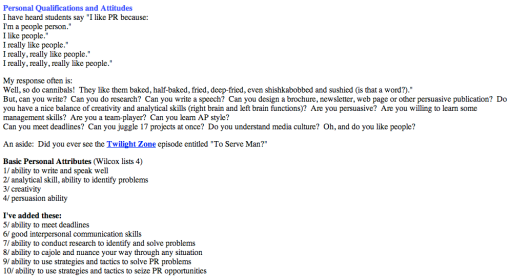
This week’s #collegejourn chat is yet another example of how great minds can come together with great ideas (if you’re unfamiliar with #collegejourn chat, read more info here). After an extra hour of chatting, a small group of dedicated #collegejourn chatters have devised a plan to get college educators on board with the 21st century:
What: “Bring a professor” Chat
Who: Educators, professionals, journalists, students
When: Sunday, Feb. 22 (8-11 p.m. EST, 5-8 p.m. PST)
Where: www.collegejourn.com
Why: To discuss ways to modernize college journalism education
A common theme that arises from each #collegejourn chat is a general dissatisfaction with college professors’ unwillingness to think forward. Put simply: j-professors are stuck in their ways. And we want to change that.
Next Sunday, Feb. 22 from 8-11 p.m. EST (5 -8 p.m. PST) we’re inviting journalism professors to join a discussion with students worldwide. The topic: how to prepare your students for the real world. We’re not just suggesting, but demanding an education that prepares us for the real world of 21st-century journalism.
We’re also working to bring this topic to a panel at the Associated Collegiate Press convention on Feb. 27 that will be updated live on the web. Check back soon for details.
How you can help us
We can’t do this alone. We need your help to promote the chat and come up with topic ideas. By tomorrow — yes, tomorrow, Feb. 16 — at midnight PST, please write a blog post about:
- How good journalism can be made better with new media tools
- How your j-school program could be improved
- What is going right at your school, or at other schools
- The one thing you could change about j-school
- What prevents professors from embracing the web
- Why learning the business side of the journalism industry will help us all
Contact Suzanne Yada (the chat moderator) with a link to your blog post: suzanneyada at gmail dot com or twitter.com/suzanneyada or post a link to your blog in the comments. We will aggregate the posts to send to participants.
Spread the word
We want everyone to be get something out of our discussion. The more, the merrier. Here are a few ways you can promote the cause:
- E-mail your professors
- Retweet the information
- Post our flyers (or make your own) in your journalism department (if your professors are unresponsive to e-mails)
- Approach your professors/faculty face-to-face
- Tell your journalism friends




